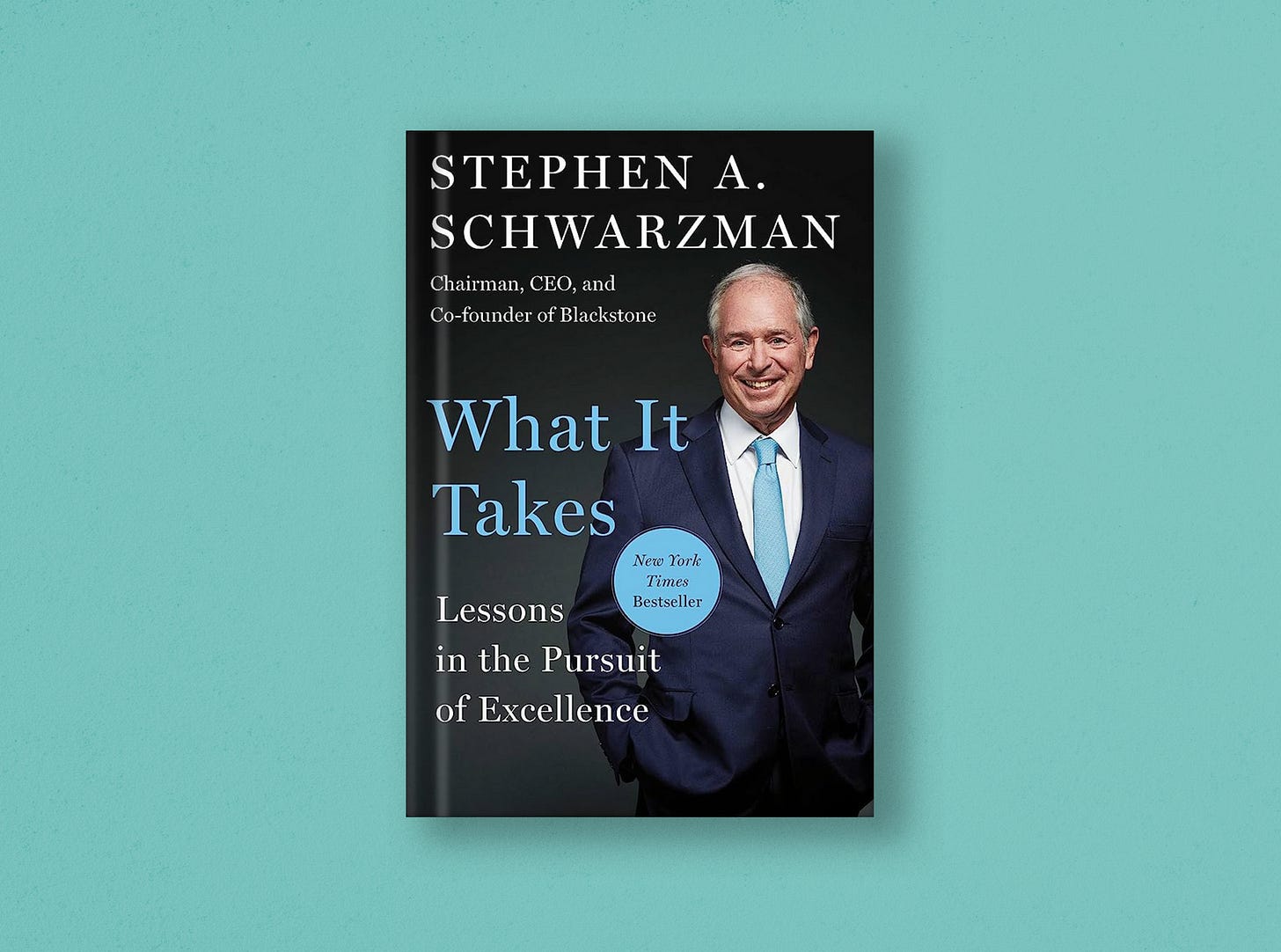What It Takes
Written by Stephen A. Schwarzman.
⏱️ The Book in Three Sentences
Dream big and aim high because anything worthwhile requires significant time and effort anyway.
Embrace mistakes and learn from them; they are a critical part of the journey and instrumental in honing one's skills and expertise.
Resilience is key in the face of hardship and adversity; it builds character, imparts invaluable lessons, and ultimately drives personal and professional growth.
🪞 Reflections
"What It Takes" by Stephen A. Schwarzman is best described as a deeply insightful look into the life of the co-founder and CEO of Blackstone, one of the world’s leading investment firms. Dense yet accessibly readable, the book unfurls the power of human ambition, resilience, and transformative thinking.
At its core, "What It Takes" is an engrossing journey through Schwarzman's entrepreneurial career – from his humble beginnings to the pinnacle of his achievements as the CEO of The Blackstone Group. The book weaves together personal anecdotes, investment strategies, and life-altering insights as Schwarzman’s candid storytelling style resonates throughout.
One aspect that struck me most was how comprehensive, personal, and inspiring the book was, specifically Schwarzman's powerful advocacy for dreaming big. He emphasizes that engaging in anything worthwhile necessitates significant time and effort. It is equally challenging to accomplish something small as it is something grand, so why not aim for the stars? While the concept of thinking big is not novel, Schwarzman's eloquence in articulating the philosophy is compelling. Since reading, I’ve spoken to a number of others who have read the book and we all agree - this lesson was the biography’s pièce de résistance.
"What It Takes" isn't just for those getting their feet wet in their careers or for those with a wealth of experience. It's for everyone at every point in their professional journey. Be it an ambitious novice striving to sharpen their skills or a seasoned professional seeking to leave a legacy, the book offers wisdom for all.
💥 Personal Impact
Schwarzman's "What It Takes" felt like a guiding light during a time of personal and professional turmoil for me.
Emerging from a particularly challenging phase at work, marred by a few grueling audits and a cascade of setbacks, my motivation was waning. Yet, Schwarzman's recounting of his own grueling years as an associate at Lehman Brothers resonated with me.
In one memorable episode from Chapter 4, Schwarzman details how he made a mistake in a report prepared for a critical fundraising presentation. The mistake was pointed out by a Partner, and in his nervousness, Schwarzman compounded the error by removing the good pages of the report instead of the erroneous ones – a blunder that came to light in the midst of the presentation.
So far, I’m fortunate not to have made such a huge error. I also certainly haven’t faced the harsh backlash Schwarzman goes on to describe from the partner. But, I have dealt with my fair share of mistakes and long hours put into work that ended up being incorrect or unnecessary. It never feels good.
Yet, Schwarzman's reflections on how those arduous years honed his skills and made him an expert in his field felt empowering. He paints a vivid picture of the countless hours he spent in the minute details, gaining exposure, and learning from his errors.
As Schwarzman found value in his tribulations, I too was reminded of the purpose behind my grind. Mastery demands tenacity and dedication. "What It Takes" imparted that extra nudge I needed to persevere.
🗣 Top Three Quotes
“It’s as hard to start and run a small business as it is to start a big one. You will suffer the same toll financially and psychologically as you bludgeon it into existence. It’s hard to raise the money and to find the right people. So if you’re going to dedicate your life to a business, which is the only way it will ever work, you should choose one with the potential to be huge.”
“If you ever feel overwhelmed by work, I said, pass on some of your work to others. It might not feel natural. High achievers tend to want to volunteer for more responsibility, not give up some of what they have taken on. But all that anyone higher up in the firm cares about is that the work is done well. There is nothing heroic or commendable about taking on too much and then screwing it up. Far better to focus on what you can do, do it well, and share the rest.”
“When you’re young, only take a job that provides you with a steep learning curve and strong training. First jobs are foundational. Don’t take a job just because it seems prestigious.”

